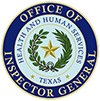OIG prevents fraud, waste and abuse before it happens
Through proactive efforts, the OIG prevented more than $38.2 million in potentially questionable spending during the first quarter of fiscal year 2022. These savings were achieved in a variety of ways, including front-end claims denials, client disqualifications, Medicaid provider exclusions, the Pharmacy Lock-In Program and WIC vendor monitoring.
The OIG recently published a detailed report for the Texas Legislature that describes cost avoidance and waste prevention activities employed by managed care organizations (MCOs) and the OIG’s efforts to combat fraud, waste and abuse (FWA) in Medicaid managed care.
The OIG surveyed all 20 MCOs and dental maintenance organizations (DMOs) participating in Texas Medicaid and the Children’s Health Insurance Program (CHIP). Respondents were asked about the use and the effectiveness of various cost avoidance activities. In the review, the OIG found MCOs implement measures to promote program integrity that fall into three broad categories: prepayment reviews, post-payment reviews and potentially preventable events:
- Prepayment review strategies focus on preventing improper payments to providers by identifying and denying claims that contain billing errors before they reach the claims system, reviewing accepted claims before payments are processed and preventing payments for improperly coded heath care services.
- Post-payment reviews occur after a provider has been paid. However, reviewing the activity prevents future FWA. For example, duplicate payment detection is a data-driven strategy that allows MCOs to recover or even prevent payments to providers claiming the same service for the same patient.
- Post-payment review strategies also include analyzing data and implementing interventions for prospective cost savings.
Potentially preventable events are tracked by MCOs to avoid waste by reducing health care encounters through intervention and prevention strategies. This effort both promotes better care and health outcomes for Medicaid clients, reducing the need for multiple provider visits related to the same issue.
The OIG will continue to collaborate with MCOs through the Cost Avoidance Workgroup, which includes representatives from all Texas MCOs, DMOs, the Texas Association of Health Plans and the Texas Association of Community Health Plans to identify effective ways to protect Texas Taxpayer dollars and protect the integrity of Medicaid delivery.
Providers and clients can learn more about the OIG’s cost avoidance efforts by reading this report or by reading the OIG’s Quarterly Reports.

